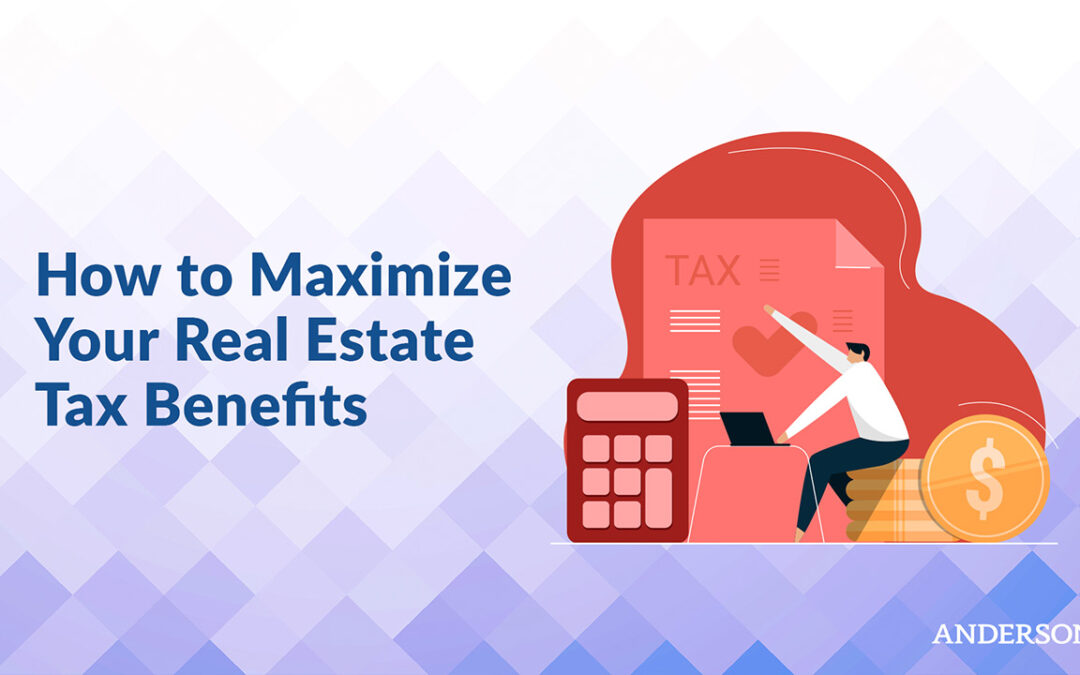
Investing in real estate is an excellent strategy to increase revenue and create wealth. In addition to the opportunity for exceptional returns, real estate investing also offers many tax benefits. This article covers eligible tax write-offs, standard deductions, structuring strategies, and current tax rules that can help you reduce your taxable liability.
Key Takeaways
- Real estate tax benefits are legal strategies that allow you to reduce your taxable liability when buying and selling assets.
- The IRS allows you to write off real estate expenses, including mortgage interest, renovation, repairs, and depreciation of assets.
- Some real estate assets qualify for pass-through deductions, which allow you to reduce up to 20% of your taxable income.
- Most real estate assets qualify for depreciation, gradual wear and tear and property value decline.
- Reviewing your tax plans each year is essential to ensure you include all deductions you’re eligible to receive.
What Are Real Estate Tax Benefits?
Real estate tax benefits are the advantages you qualify for when buying and selling real estate assets. Current tax laws allow you to deduct expenses and depreciation from your real estate capital gains. You can also pursue specific programs, like investing in opportunity zones or a 1031 exchange, to reduce your taxable liability. Learning about these tax benefits helps you maximize your profits when investing in real estate.
Tax & Asset Protection Workshop
Learn about Real Estate & Asset Protection at our next
FREE LIVE STREAM
How To Maximize Your Real Estate Tax Benefits
Maximize your real estate tax benefits with the following strategies.
Use Tax Write-Offs
Investing in real estate can be profitable but does involve many expenses. The good thing is that the Internal Revenue Service (IRS) allows you to write off your expenses. Real estate expenses are any costs you spend purchasing, renovating, managing, or marketing the property. A few examples of eligible tax write-offs may include:
- Mortgage interest.
- Property taxes.
- Insurance.
- Property management fees.
- Maintenance and repairs.
- Marketing.
- Office rent.
- Travel.
- Business equipment.
- Legal fees.
Keep receipts and notes of all expenses to help you prepare your taxes during tax season. You must also keep copies of these records for verification if the IRS decides to audit you.
Pass-Through Deductions
Pass-through deductions allow you to deduct up to 20% of losses from your business income on your taxes. However, your earned revenue must come from real estate structured as a sole proprietor limited liability company (LLC) or S Corp to qualify for pass-through deductions. Keep in mind income limitations exist for those who qualify for pass-through deductions. For 2023, the income limits are $182,100 for single filers and $364,200 for joint filers.
Purchase Assets in a Self-Directed IRA
Individual retirement accounts (IRAs) and Roth IRAs are great ways to save for retirement while deferring taxes. You can also use a self-directed IRA to own real estate assets. This strategy involves hiring a trust holder, creating a self-directed IRA, and transferring funds to the account. Then, you can buy and own investments through the account by setting up an LLC. It may be more challenging to finance properties through a self-directed IRA, but it’s possible.
Claim Depreciation
Most assets depreciate over time, which refers to a gradual decrease in value. In real estate, depreciation is due to wear and tear. The IRS allows you to claim depreciation on all your real estate assets. The average life of a property is 27 1/2 years for residential properties and 39 years for commercial properties, which means you can claim depreciation over this timeline.
To determine your depreciation value, divide the building’s value by either 27 1/2 or 39, leaving you with the maximum amount you can claim in depreciation per year. However, it’s important to note that you’ll have to pay taxes on deprecation when you sell, so make sure you include this factor in your tax planning. If you never plan on selling, you won’t ever pay the depreciation recapture.
Choose Real Estate Assets in Opportunity Zones
Opportunity zones are low-income areas determined by the U.S. Department of Treasury in 2018 as part of the Tax Cuts and Job Act to improve housing in more than 8,764 federally designated Qualified Opportunity Zones. Purchasing properties or land in these zones may offer many benefits, including the ability to defer capital gains, increase your revenue, and even avoid capital gains taxes if you hold onto the property for more than 10 years.
Time the Sale of Your Real Estate Assets
The tax rate on short-term capital gains is often much higher than on long-term capital gains, depending on your tax bracket. When you buy and sell an asset within the same year, you’re subject to short-term capital gains, taxed at your regular income rate. For some investors, this amount may be as high as 35%. Additionally, buying and selling too many real estate assets within the same year may lead to the government classifying you as a dealer, which leads to double Federal Insurance Contributions Act (FICA) taxes.
Holding real estate assets for at least one year can reduce your taxable liability. Long-term capital gains are taxed as regular income, either 0%, 15%, or 20%, depending on your filing status. You only owe taxes on gains the year you sell, meaning you can time the sale of a real estate asset to a year in which you earn less and are in a lower tax bracket.
Sell Assets Through an Installment Sale
You could also structure the sale of a real estate asset as an installment sale. Spread out your liabilities by collecting a lump sum upfront and requiring further installments in different tax years. You only owe taxes on any earnings you receive in that year. You could also sell your properties through lease-to-own agreements, which means you can divide taxable income over a more extended period.
Use a 1031 Exchange
A 1031 exchange allows you to sell a real estate asset and roll your tax liabilities into purchasing a similar property of equal or greater value to defer taxes. You can continue using 1031 exchanges if the new asset you are buying qualifies, but you’ll owe taxes once you sell and don’t replace the investment. While a 1031 exchange limits your ability to access capital, it does allow you to defer taxes on investments as long as you want.
Borrow Against Your Home’s Equity
You typically build equity in your real estate assets as you continue making mortgage payments or improving property through renovations. Equity is the difference between the value of your home and how much you owe a lender. It equals the amount you’ll receive in profits should you sell your asset and pay off the mortgage.
You are subject to capital gains taxes on any earned equity you receive when selling your property in the same year of the sale. You can borrow against the equity by refinancing your loan into a new mortgage and collecting the difference in cash. You can then use this money to fund additional projects or add value to the property. Continue borrowing against your asset’s equity, and you can defer taxes as long as you want.
Renovate Real Estate Projects While Living in Them
Living in your current real estate project could qualify you for capital gains exemptions. The government allows for a $250,000 per person capital gains exemption ($500,000 if married filing jointly) on personal property as long as you live in the property for at least two years. This approach can be a great strategy to reduce your taxable obligation if you can tolerate the inconvenience of living among heavy equipment and frequent renovations.
Planning for taxes is an essential part of investing in real estate. Taxes can quickly decrease your capital gains from buying and selling real estate. The government allows real estate investors to take advantage of many strategies and exemptions that could reduce their taxable liability and maximize their profits.
Create an Estate Plan
Estate planning isn’t just for living wills and trusts. Creating an estate plan also offers many tax advantages, including transferring your real estate assets to your beneficiaries tax-free. Also, by reducing your taxable liability each year, you’ll have more to leave behind to your heirs. Creating an estate plan may also qualify you for even more tax benefits, like the ability to structure your real estate assets into trusts that shield your identity or minimize your taxable liability.
Sign Up for One of Our Tax Planning Workshops Today
Investing in real estate can be profitable if you put the right tax planning strategies in place. Sign up for one of our tax planning workshops today to learn techniques to pay less money in taxes legally. Whether you’re interested in learning how to invest in real estate or seeking strategies to reduce your tax bill, we have the resources you need. We’ll help you review some of the most common approaches that can protect and preserve your wealth earned through real estate investing.
Free Strategy Session with an Anderson Advisor
Receive a detailed risk assessment to assist in lowering problem areas that could wipe out all of your assets with one wrong move. Speak with an Anderson Professional Advisor to get your FREE Strategy Session.
Limited-Time Offer: ($750 value.)












